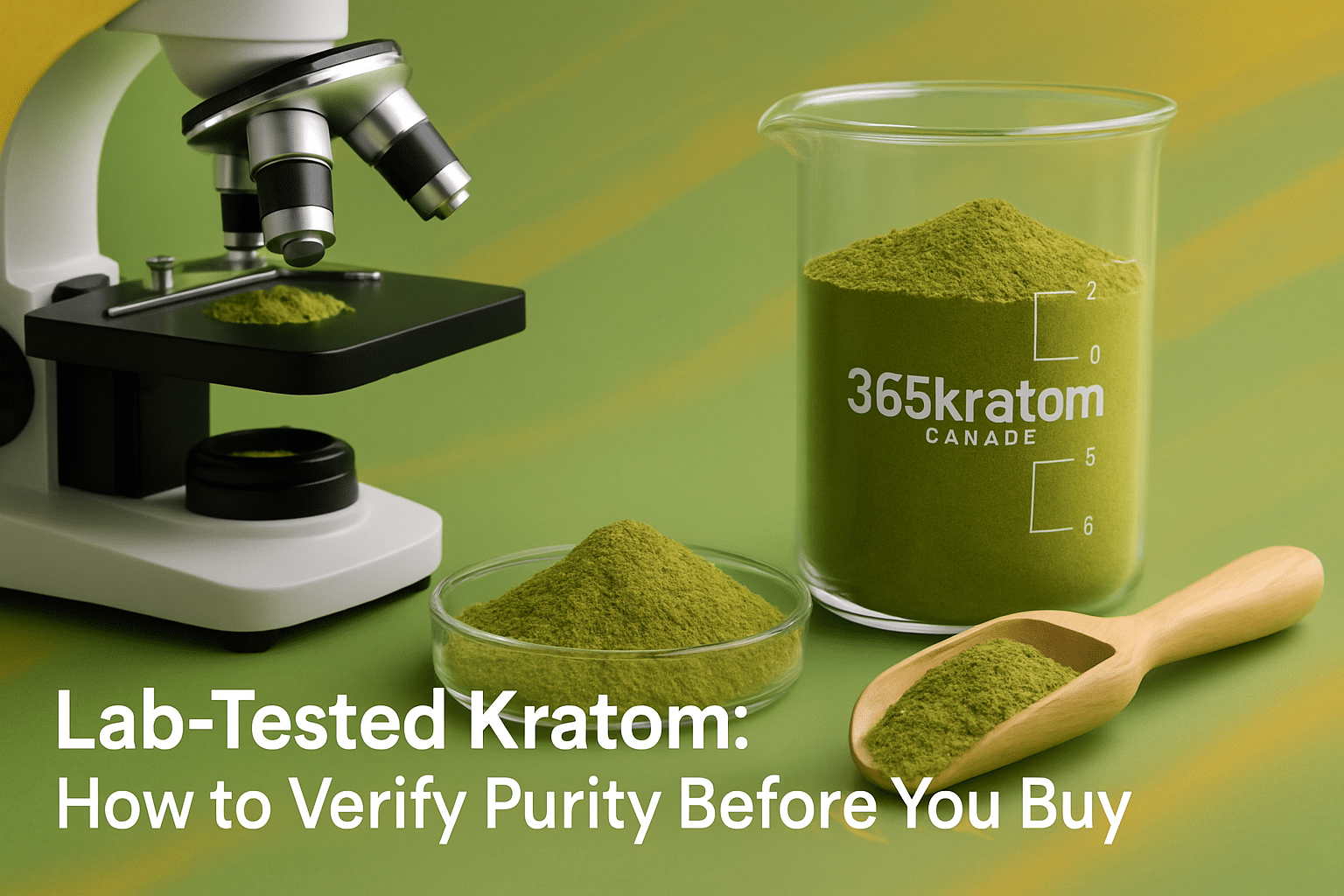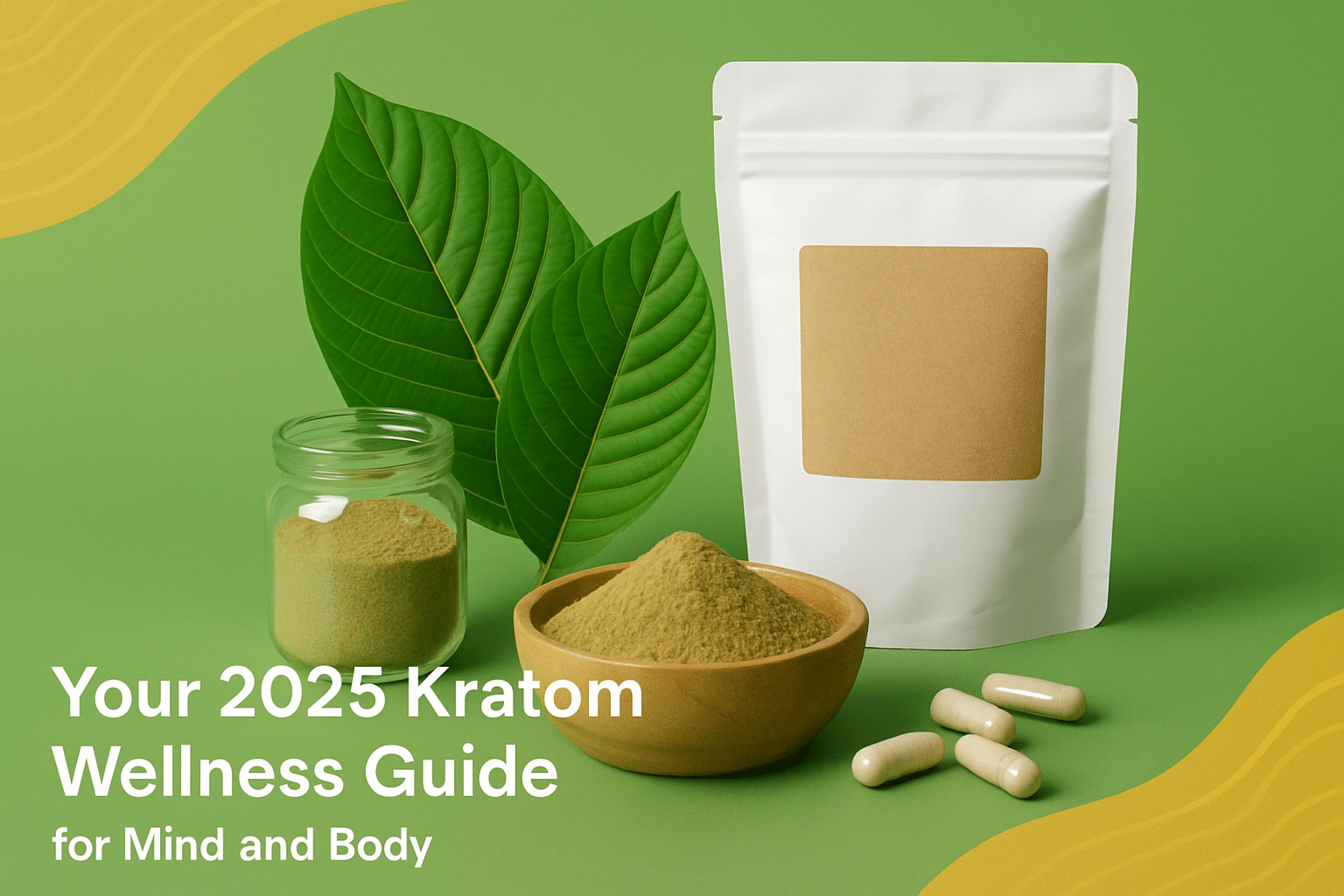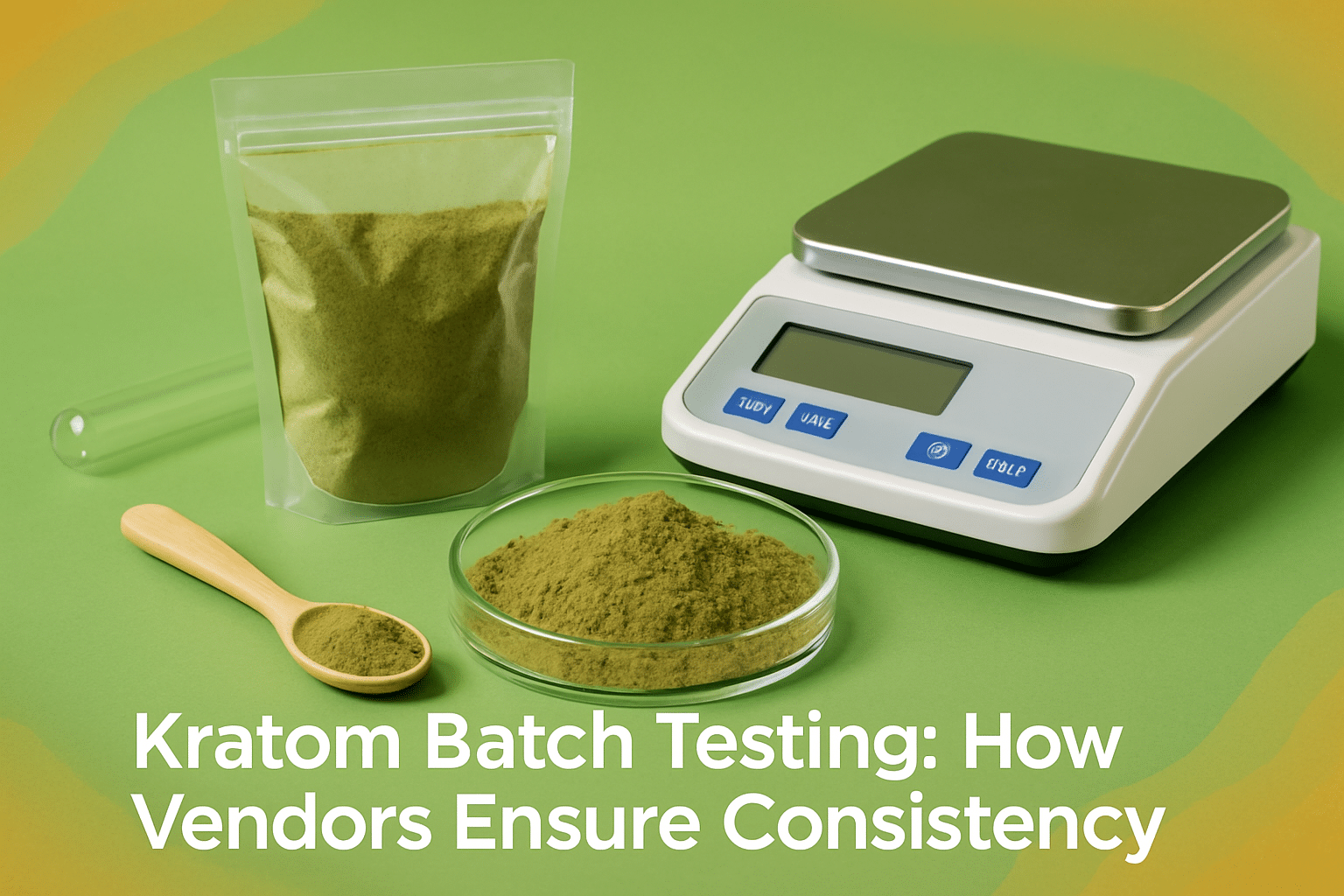In Canada’s growing kratom market, one statistic stands out: approximately 30% of herbal product certificates of analysis available online contain falsified or incomplete information. This alarming reality makes understanding lab tested kratom not just important—it’s essential for your safety and satisfaction as a consumer.
When you’re searching for premium kratom products, laboratory testing serves as your shield against contaminated, adulterated, or inconsistent products. Quality vendors invest in comprehensive testing protocols that screen for everything from harmful bacteria to heavy metals, ensuring every batch meets strict safety standards.
This guide will walk you through everything you need to know about lab tested kratom. You’ll learn how to identify authentic test results, understand what quality assurance looks like, and make informed decisions when choosing kratom products in Canada.
What Makes Kratom Lab Tested and Why It Matters
Understanding Third-Party Laboratory Testing Standards
Third-party laboratory testing provides unbiased verification that kratom products meet safety and quality standards. Unlike in-house testing conducted by manufacturers, independent labs have no financial incentive to manipulate results. Research shows that 78% of herbal manufacturers use third-party testing for quality compliance, establishing it as an industry standard for reliable verification.
These laboratories follow strict protocols to analyze kratom samples using advanced equipment and validated testing methods. The process involves extracting samples from actual product batches, not just representative samples, ensuring accuracy across entire production runs.
Key Contaminants and Adulterants Testing Identifies
Laboratory testing screens for multiple categories of potentially harmful substances that can contaminate kratom during cultivation, processing, or storage. Microbial contaminants pose serious health risks, as demonstrated by a CDC report identifying Salmonella contamination in 199 kratom-related cases across 41 U.S. states.
Common contaminants include:
-
Bacterial pathogens like E. coli and Salmonella
-
Heavy metals including lead, mercury, and cadmium
-
Pesticide residues from agricultural treatments
-
Yeast and mold from improper storage conditions
-
Foreign matter such as plant debris or adulterants
Testing also verifies that products haven’t been mixed with synthetic compounds or other botanical materials that could alter effects or cause adverse reactions.
How Lab Testing Protects Canadian Kratom Users
Canadian consumers face unique regulatory challenges since kratom exists in a legal gray area. Without mandatory government testing requirements, lab tested kratom becomes your primary protection against contaminated products. Health Canada reported over 500 incidents of contaminated natural health products in 2022, highlighting the importance of independent verification.
Laboratory testing provides several layers of protection for Canadian users:
-
Quality consistency across different batches and orders
-
Contamination prevention through comprehensive screening
-
Potency verification ensuring you receive expected alkaloid levels
-
Legal compliance with import safety standards
This testing becomes especially important when kratom travels long distances from Southeast Asian farms to Canadian consumers, creating multiple opportunities for contamination during transport and storage.
Essential Lab Test Results to Look for in Quality Kratom
Heavy Metals and Microbial Contamination Screening
Heavy metal contamination represents one of the most serious risks in kratom products. Studies from Thailand found that 25% of tested samples contained heavy metals exceeding safe limits, making rigorous screening essential for consumer safety.
Quality lab reports should include testing for:
|
Heavy Metal |
Safe Limit (ppm) |
Health Risks if Exceeded |
|---|---|---|
|
Lead |
≤ 0.5 |
Neurological damage, kidney problems |
|
Mercury |
≤ 0.1 |
Brain and nervous system damage |
|
Cadmium |
≤ 0.3 |
Kidney damage, bone disease |
|
Arsenic |
≤ 1.0 |
Cancer risk, skin problems |
Microbial testing should screen for total aerobic bacteria, yeast, mold, and specific pathogens. Results should show counts well below established safety thresholds, typically less than 10,000 CFU/g for total bacteria and absence of harmful pathogens like Salmonella and E. coli.
Alkaloid Profile and Potency Verification
Alkaloid testing verifies the presence and concentration of kratom’s active compounds, primarily mitragynine and 7-hydroxymitragynine. Research from Malaysia demonstrated that mitragynine levels varied by 40% in unverified batches, emphasizing the importance of consistent potency verification.
Comprehensive alkaloid analysis should include:
-
Total alkaloid content (typically 1-3% of dry weight)
-
Mitragynine levels (primary active alkaloid)
-
7-hydroxymitragynine content (potent secondary alkaloid)
-
Additional alkaloids like speciociliatine and paynantheine
These results help you understand product potency and ensure consistency between purchases. Reputable vendors provide detailed alkaloid profiles that remain relatively stable across batches from the same strain and harvest.
Pesticide and Chemical Residue Analysis
Agricultural kratom cultivation often involves pesticide treatments that can leave harmful residues in final products. A 2021 EU report found pesticide residues in 15% of imported herbal products from Southeast Asia, making residue analysis crucial for safety.
Comprehensive pesticide screening should test for:
-
Organophosphates and carbamates
-
Organochlorines and synthetic pyrethroids
-
Herbicide residues including glyphosate
-
Fungicides used during storage
Quality test results show either non-detect levels or concentrations well below established maximum residue limits. Some vendors go beyond basic screening to test for hundreds of different chemical compounds, providing additional safety assurance.
How to Read and Verify Kratom Test Certificates
Identifying Authentic Certificates of Analysis (COAs)
Certificate of Analysis documents serve as your primary tool for verifying kratom quality and safety. However, authenticity concerns are significant—the FDA found that 30% of online herbal COAs were falsified or incomplete, making careful evaluation essential.
Authentic COAs contain specific identifying information:
-
Laboratory name and accreditation details
-
Unique certificate number for verification
-
Sample identification matching your product batch
-
Test dates and methodology references
-
Clear pass/fail results with numerical values
-
Laboratory technician signatures or digital verification
The document should reference the actual testing laboratory, not just the vendor’s internal quality control. Look for direct contact information allowing you to verify results with the testing facility.
Understanding Lab Accreditation and Testing Methods
Laboratory accreditation provides confidence that testing facilities maintain proper standards and procedures. The ISO/IEC 17025 standard was held by 85% of global testing labs in recent surveys, representing the gold standard for testing competence.
Key accreditation indicators include:
-
ISO/IEC 17025 certification for testing competence
-
Regional accreditation from bodies like A2LA or NVLAP
-
Scope of accreditation covering kratom-specific tests
-
Regular proficiency testing participation
Testing methods should follow established protocols like USP (United States Pharmacopeia) or AOAC (Association of Official Analytical Chemists) standards. These validated methods ensure consistent, reliable results across different laboratories and testing sessions.
Red Flags in Fake or Misleading Test Results
Several warning signs indicate potentially fraudulent or misleading test certificates. Be cautious of COAs that lack specific laboratory information or show results that seem too perfect across all parameters.
Common red flags include:
-
Missing laboratory contact information or fake lab names
-
Generic batch numbers not matching your product
-
Perfect results across all categories (extremely unlikely)
-
Outdated test dates from months or years ago
-
Vague result descriptions without specific numerical values
-
Poor document quality with formatting issues or typos
Legitimate laboratories encourage verification calls and provide detailed explanations of their testing procedures. If a vendor refuses to provide additional verification or seems evasive about their testing protocols, consider it a significant warning sign.
Questions to Ask Kratom Vendors About Lab Testing
Batch-Specific Testing vs. General Product Testing
Understanding whether vendors conduct batch-specific testing or rely on general product testing significantly impacts quality assurance. Research in the Journal of Dietary Supplements showed batch-specific testing reduced variability by 60% in herbal products, making it far superior to occasional sampling.
Essential questions about testing frequency include:
-
“Do you test every batch individually?”
-
“How often do you conduct full panel testing?”
-
“Can you provide the COA for my specific batch number?”
-
“What’s your protocol when batches fail testing?”
Batch-specific testing ensures that your exact product has been analyzed, not just a representative sample from the same supplier. This approach catches contamination events that might affect individual shipments while maintaining consistent quality standards.
Frequency of Testing and Lab Partnership Details
Regular testing schedules and established laboratory relationships indicate serious quality commitments. Vendors should maintain ongoing partnerships with accredited facilities rather than shopping for the cheapest testing options.
Important partnership questions include:
-
“Which laboratories do you use for testing?”
-
“How long have you worked with your testing partners?”
-
“Do you use multiple labs for verification?”
-
“What’s your testing schedule for new inventory?”
Quality vendors often use multiple laboratories to cross-verify results and maintain backup testing capabilities. They should readily share laboratory names and encourage you to verify their accreditation status independently.
Transparency in Sharing Complete Test Results
Full transparency in test result sharing demonstrates vendor confidence in their products and testing protocols. Consumer research found that 70% of buyers preferred vendors providing complete test transparency for botanical products.
Transparency indicators include:
-
Complete COAs posted publicly on websites
-
Batch-specific results available upon request
-
Historical testing data showing consistency over time
-
Failed test disclosures and remediation actions
-
Testing methodology explanations in accessible language
Reputable vendors don’t hide testing information behind customer service requests or make you jump through hoops to access COAs. They understand that transparency builds trust and demonstrates their commitment to quality kratom purity testing methods.
Where to Find Trusted Lab Tested Kratom in Canada
Identifying Reputable Canadian Kratom Vendors
Finding reliable sources for lab tested kratom requires evaluating multiple factors beyond just testing claims. Start by researching vendor histories, customer feedback, and their approach to quality assurance programs that align with Canadian standards.
Key vendor evaluation criteria include:
-
Established business history with verifiable Canadian operations
-
Comprehensive testing protocols covering all major risk categories
-
Customer education resources explaining their quality processes
-
Responsive customer service providing detailed product information
-
Clear batch tracking systems linking products to specific test results
Look for vendors who invest in education and transparency rather than just marketing claims. Quality suppliers understand that informed customers become loyal customers and willingly share detailed information about their sourcing and testing procedures.
What Quality Assurance Programs Look Like
Professional quality assurance extends far beyond basic laboratory testing to encompass entire supply chain management. Canada’s Natural Health Products Regulations required quality assurance for 95% of licensed products in 2021, providing a framework for comprehensive safety programs.
Comprehensive quality programs include:
-
Supplier verification and relationship management
-
Incoming material inspection before processing
-
Environmental controls during storage and handling
-
Documentation systems tracking products from source to sale
-
Regular auditing of processes and procedures
These programs ensure consistent quality beyond just testing individual batches. They create systematic approaches to contamination prevention and quality maintenance throughout the entire supply chain.
Building Long-Term Relationships with Transparent Suppliers
Developing relationships with trustworthy vendors provides ongoing access to consistent, high-quality lab tested kratom products. The best suppliers view customer relationships as partnerships built on mutual trust and open communication.
Relationship building strategies include:
-
Regular communication about product quality and testing updates
-
Feedback sharing about product experiences and preferences
-
Educational engagement learning about kratom quality and safety
-
Loyalty program participation when available from trusted vendors
Companies like 365 Kratom Canada exemplify this approach by offering comprehensive testing documentation for their proprietary blends like Sunrise, Clarity, and Relax. Their commitment to batch-specific testing and transparency creates the foundation for long-term customer relationships based on quality and trust.
Frequently Asked Questions
What does lab tested kratom mean exactly?
Lab tested kratom means the product has been analyzed by independent laboratories for safety, purity, and potency. Testing typically screens for contaminants like heavy metals, bacteria, pesticides, and adulterants while verifying alkaloid content. This process ensures you’re receiving authentic kratom free from harmful substances.
How can I verify if kratom test results are real?
Verify test results by checking the laboratory’s accreditation status and contacting them directly to confirm certificate authenticity. Look for specific batch numbers matching your product, recent test dates, and detailed laboratory contact information. Authentic labs encourage verification calls and readily confirm their testing relationships with vendors.
What’s the difference between third-party and in-house testing?
Third-party testing uses independent laboratories with no financial connection to the vendor, providing unbiased results. In-house testing is conducted by the manufacturer or vendor themselves, creating potential conflicts of interest. Third-party testing offers greater credibility and reliability for safety verification.
How often should kratom batches be tested?
Quality vendors test every individual batch before release, ensuring each shipment meets safety standards. Some suppliers also conduct periodic retesting of stored inventory and use multiple laboratories for verification. Batch-specific testing provides the highest level of quality assurance compared to periodic sampling.
What should I do if a vendor won’t share test results?
If vendors refuse to provide certificates of analysis or seem evasive about testing protocols, consider it a significant red flag. Reputable suppliers readily share complete test results and encourage customer verification. Look for alternative vendors who prioritize transparency and comprehensive testing documentation.
Conclusion
Understanding lab tested kratom empowers you to make informed decisions and avoid contaminated or adulterated products in Canada’s evolving market. Quality testing provides essential protection against harmful contaminants while ensuring consistent potency and purity across your purchases.
The key lies in learning to identify authentic test results, asking the right questions, and building relationships with transparent vendors who prioritize comprehensive quality assurance programs.
Ready to experience the difference that comprehensive testing makes? Explore 365 Kratom Canada’s collection of rigorously tested premium kratom blends including their popular Uplift and Goodnight formulations, each backed by detailed certificates of analysis and batch-specific testing results.



